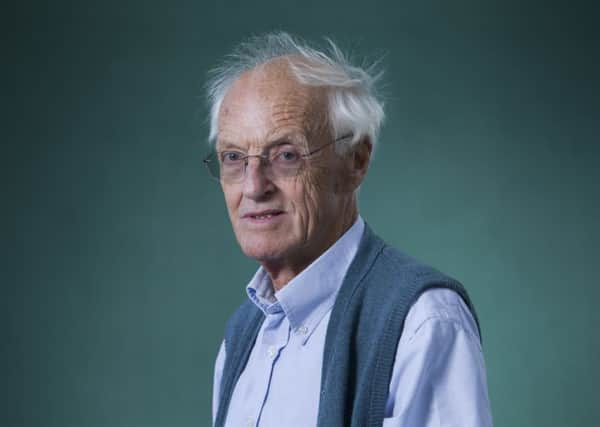Book Festival: Michael Frayn | Lucy Ribchester | Care Santos


THE beauty of small things was up for consideration at the Book Festival yesterday afternoon as veteran playwright and novelist Michael Frayn presented his most recent book, Matchbox Theatre, a collection of 30 very short plays. When chairwoman Sheena McDonald persuaded her husband, the journalist Alan Little, to join her on stage to perform one of them, Between Cheese and Jam, an acutely observed mobile phone conversation between a husband and wife, it took some time for the laughter to subside.
Frayn is a superb raconteur and spoke with disarming openness and good humour about the ups and downs of his long career, admitting that Matchbox Theatre was only published because his wife, the award-winning biographer Claire Tomalin, showed some of the plays to his publisher behind his back.
Advertisement
Hide AdHe described how he “turned against the theatre” in his final year at Cambridge, having written a play for Footlights which did not transfer to the West End (as Footlights shows usually did) because it was deemed insufficiently funny. He returned to the theatre when he was asked by a friend to fill a gap in a bill of short plays.
That play did not make it on to the stage because the producer objected to the fact that it featured a child’s nappy being changed, but it inspired Frayn to create his own evening of four short plays, The Two of Us. This was another flop, but Richard Briers, who acted in it with Lynn Redgrave, gave Frayn a biography of Noel Coward. Reading it, Frayn found, to his surprise, that even Coward had his flops. “I realised that a flop doesn’t last very long, and a success is going to be seen by a lot of people. If you can remain on your feet and keep going, people will remember the successes and forget the flops.”
Ironically, one of Frayn’s biggest successes is Noises Off, a farce about a group of actors trying – and mostly failing – to stage a farce. When invited to consider what has made it such an enduring success, he suggested that, however hilarious, it has a serious issue at its heart.
“I think what it’s about is people carrying on with their planned life in the face of disaster. I think we all fear breakdown, that you can’t go on with the show.” He described the first Russian production of Noises Off, during the glasnost era. Knowing nothing of farce in their theatrical tradition, the actors played it with utmost seriousness. The result? It was hilarious.
Another of Frayn’s hit plays is Copenhagen, the story of a meeting in 1941 between the physicists Werner Heisenberg and Niels Bohr, while Denmark is under German occupation. Initially “inhibited” by the idea of writing about historical figures, Frayn said the characters soon did what all fictional characters do: they took on a life of their own. But a conversation with Heisenberg’s son after the opening night of the play in New York led him to reflect on the value of writing fiction about historical events: “It can bring out the feelings and thoughts that don’t get expressed in everyday life.”
This echoed the sentiments of novelists Lucy Ribchester and Care Santos, whose books take their inspiration from characters and events in history. Ribchester’s novel, The Hour-Glass Factory, has been described as a “romp” through suffragette history, via trapeze artists, corsetiers, music hall performers and a determined, trousers-wearing woman journalist.
Advertisement
Hide AdSantos, who is celebrated in her native Spain as a writer for both children and adults, began her novel, Desire for Chocolate, when she discovered the story of a real-life chocolatier in 18th-century Barcelona who invented a machine for making chocolate.
The narrating of personal histories was up for discussion in the morning by another fascinating pair of novelists, Samantha Harvey and Zimbabwe-born Petina Gappah. Both novels take the form of a single long letter written by their protagonists, neither of whom is an entirely reliable conduit for their own story.
Advertisement
Hide AdHarvey’s Dear Thief is written by a nameless woman to the former friend who eloped with her husband, Gappah’s The Wilderness, by a woman on death row in prison in Zimbabwe, telling an American journalist the “true” story of the crime she is accused of committing.